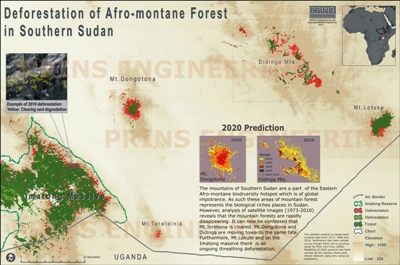Jonglei state authorities call for enactment of forest laws
March 17, 2017 (BOR) – Authorities in South Sudan’s Jonglei state have intensified calls for the enactment of forest laws, saying illegal cutting of trees has led to loss of thousands of indigenous tree species in the area.

The practice, he said, could lead to complete loss of forests, if uncontrolled.
“Forest laws are supposed to be passed in this country, and when these laws are passed, there should be forest reserves, if they are marked, they can be deserted to make sure that there is no encroachment. When the state has a forest reserve that means there is a future for that”, Anyieth told reporters in the capital, Bor Saturday.
“We have seen a lot of destruction taking place. Forest is being cut without permits, without laws and protection. Supposed if forest laws are passed, there will be protection”, stressed the senior ministry official.
He urged cabinet and lawmakers in Jonglei state to swiftly enact laws that will allow his directorate control random cutting of trees in the surrounding areas.
South Sudan has no forestry policy. And authorities are worried they could lose the country’s tropical forests; unless stringent measures are put in place to curb the rampant rate of illegal logging.
These fears come barely a year after conservationists from the Wildlife Conservation Society (WCS) warned of dangers the lie ahead as the country’s wildlife and natural resources face an alarming expansion of illegal exploitation, trafficking and logging.
The report, the agency stated, was based on scientific monitoring and investigations undertaken its team undertook in cooperation with local partners over the past months, which documented a sharp rise in illegal activities in various areas of the young nation.
Cited as an immediate threat to South Sudan’s forests were illegal logging, gold mining and charcoal production, among others.
Sadly, however, these illegal activities are reportedly being perpetrated by local and international individuals and actors, including members of various armed groups active in the country.
South Sudan is currently embroiled in a conflict that has killed tens of thousands of the population, displacing nearly two million of them.
According to conservationists, prior to the outbreak of its war in December 2013, South Sudan’s extensive areas of untouched natural woodlands, forests, and savannas, were home to wildlife populations including approximately 2,500 elephant, hundreds of giraffes, the endemic Nile Lechwe and white-eared kob tiang, Mongalla antelope migrations, wild dog and chimpanzees.
However, over the past two years of armed conflict, the various armed forces across the country, WCS said, have been implicated in several cases of large-scale illegal exploitation of natural resources.
A 2010 study conducted by the United Nations Food and Agricultural Organization (FAO), dubbed the “Forest Resources Assessment”, estimated that a high rate of up to 2,776 square kilometres of forests and other wooded land were being lost annually in South Sudan.
(ST)
